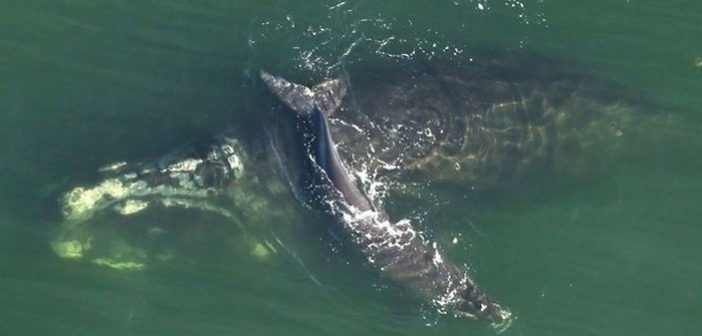Here’s a terrible story from Patch about a new-born right whale calf apparently being hit by a boat prop; the injuries may prevent it from nursing and surviving:
ST. PETERSBURG, FL — The FWC Fish and Wildlife Research Institute in St. Petersburg is closely monitoring a rare right whale and her calf after the calf was discovered with two open wounds on its head consistent with a boat propeller last week.
“The injuries are concerning because of the severity and location of the wounds,” commented marine biologists at the research institute. “One of the injuries appears to include damage to the calf’s mouth which could hamper its ability to nurse and feed.”
If the calf is unable to nurse properly, it will slowly starve.
The mother right whale, named Derecha, which means “right” in Spanish, gave birth to the fourth right whale calf of the season. Derecha, who is about 27 years old, was first documented in December 1993. This is her fourth calf.
The North Atlantic right whale, Eubalaena glacialis, is closely monitored because it is one of the most endangered marine animals in the ocean. There are only an estimated 400 whales left in the world.
Biologists estimate the calf was just a few days old when it was struck by the boat propeller Jan. 8. The strike left a gash on the calf’s upper jaw.
The wounds were hours old when an aerial team dispatched by National Oceanic and Atmospheric Administration spotted the whale and calf about 8 nautical miles off Georgia. Teams with the Georgia Department of Natural Resources and Clearwater Marine Aquarium were immediately sent by sea and air to assess the calf’s condition.
NOAA Fisheries Service is asking anyone with information leading up to the calf’s injuries to contact 1-877-WHALE-HELP (1-877-942-5343). The boat that struck the calf may likely have propeller damage.
To avoid coming into contact with right whales, the research institute recommends that boaters wear polarized sunglasses to better spot whales and reduce speeds in areas where whales are likely to be. Boaters should remain at least 500 yards away from whales.
Moms and calves spend the majority of their time a few feet below the water’s surface.
“The protection of these animals is literally in the hands of all mariners on the water and all businesses that service those vessels,” said the FWC Fish and Wildlife Research Institute. “Stay educated, remain alert and choose wisely how you operate your vessel while traveling through a whale neonatal center.”
Right whales were once found throughout the North Atlantic Ocean, and were prized by early whalers due to their slow speeds, coastal habitat and thick blubber. They were considered the “right” whale to hunt, thus the name. By the early 1700s, the right whale population was so reduced that they were no longer of economic importance. Read more:
https://patch.com/florida/stpete/1st-right-whale-calf-season-injured-boat-strike




